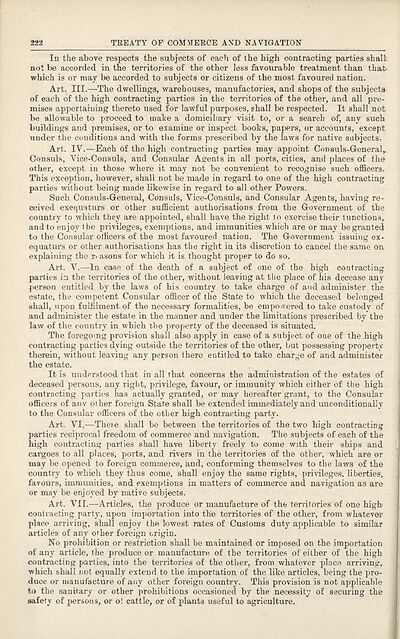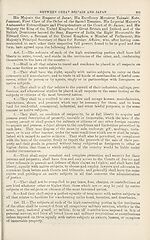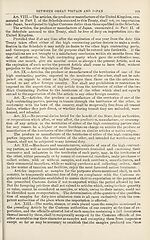1924
(278) Page 222
Download files
Complete book:
Individual page:
Thumbnail gallery: Grid view | List view

TEEATY OF COMMERCE AND NAVIGATION
la the above respects the subjects of each of the high contracting parties shall
not be accorded in the territories of the other less favourable treatment than that-
which is or may be accorded to subjects or citizens of the most favoured nation.
Art. III.—The dwellings, warehouses, manufactories, and shops of the subjects-
of each of the high contracting parties in the territories of the other, and all pre¬
mises appertaining thereto used for lawful purposes, shall be respected. It shall not
be allowable to proceed to make a domiciliary visit to, or a search of, any such
buildings and premises, or to examine or inspect books, papers, or accounts, except
under the conditions and with the forms prescribed by the laws for native subjects.
Art. IV.—Each of the high contracting parties may appoint Consuls-General^
Consuls, Vice-Consuls, and Consular Agents in all ports, cities, and places of the
other, except in those where it may not be convenient to recognise such officers.
This exception, however, shall not be made in regard to one of the high contracting
parties without being made likewise in regard to all other Powers.
Such Consuls-General, Consuls, Vice-Consuls, and Consular Agents, having re¬
ceived exequaturs or other sufficient authorisations from the Government of the
country to which they are appointed, shall have the right to exercise their tunctions,
and to enjoy the privileges, exemptions, and immunities which are or may be granted!
to the Consular officers of the most favoured nation. The Government issuing ex¬
equaturs or other authorisations has the right in its discretion to cancel the same on
explaining the reasons for which it is thought proper to do so.
Art. V.—In case of the death of a subject of one of the high contracting
parties in the territories of the other, without leaving at the place of his decease any
person entitled by the laws of his country to take charge of and administer the
estate, the competent Consular officer of the State to which the deceased belonged
shall, upon fulfilment of the necessary formalities, be empowered to take custody of
and administer the estate in the manner and under the limitations prescribed by the
law of the country in which the property of the deceased is situated.
The foregoing provision shall also apply in case of a subject of one of the high
contracting parties dying outside the territories of the other, but possessing property
therein, without leaving any person there entitled to take charge of and administer
the estate.
It is understood that in all that concerns the administration of the estates of
deceased persons, any right, privilege, favour, or immunity which either of the high
contracting parties has actually granted, or may hereafter grant, to the Consular
officers of anv other foreign State shall be extended immediately and unconditionally
to the Consular officers of the other high contracting party.
Art. VI.—Theie shall be between the territories of the two high contracting
parties reciprocal freedom of commerce and navigation. The subjects of each of the
high contracting parties shall have liberty freely to come with their ships and
cargoes to all places, ports, and rivers in the territories of the other, which are or
may be opened to foreign commerce, and, conforming themselves to the laws of the
country to which they thus come, shall enjoy the same rights, privileges, liberties,
favours, immunities, and exemptions in matters of commerce and navigation as are
or may be enjoyed by native subjects.
Art. VII.—Articles, the produce or manufacture of the territories of one high
contracting party, upon importation into the territories of the other, from whatever
place arriving, shall enjoy the lowest rates of Customs duty applicable to similar
articles of any other foreign origin.
No prohibition or restriction shall be maintained or imposed on the importation
of any article, the produce or manufacture of the territories of either of the high
contracting parties, into the territories of the other, from whatever place arriving,
which shall not equally extend to the importation of the like articles, being the pro¬
duce or manufacture of any other foreign country. This provision is not applicable
to the sanitary or other prohibitions occasioned by the necessity of securing the
safety of persons, or ot cattle, or of plants useful to agriculture.
la the above respects the subjects of each of the high contracting parties shall
not be accorded in the territories of the other less favourable treatment than that-
which is or may be accorded to subjects or citizens of the most favoured nation.
Art. III.—The dwellings, warehouses, manufactories, and shops of the subjects-
of each of the high contracting parties in the territories of the other, and all pre¬
mises appertaining thereto used for lawful purposes, shall be respected. It shall not
be allowable to proceed to make a domiciliary visit to, or a search of, any such
buildings and premises, or to examine or inspect books, papers, or accounts, except
under the conditions and with the forms prescribed by the laws for native subjects.
Art. IV.—Each of the high contracting parties may appoint Consuls-General^
Consuls, Vice-Consuls, and Consular Agents in all ports, cities, and places of the
other, except in those where it may not be convenient to recognise such officers.
This exception, however, shall not be made in regard to one of the high contracting
parties without being made likewise in regard to all other Powers.
Such Consuls-General, Consuls, Vice-Consuls, and Consular Agents, having re¬
ceived exequaturs or other sufficient authorisations from the Government of the
country to which they are appointed, shall have the right to exercise their tunctions,
and to enjoy the privileges, exemptions, and immunities which are or may be granted!
to the Consular officers of the most favoured nation. The Government issuing ex¬
equaturs or other authorisations has the right in its discretion to cancel the same on
explaining the reasons for which it is thought proper to do so.
Art. V.—In case of the death of a subject of one of the high contracting
parties in the territories of the other, without leaving at the place of his decease any
person entitled by the laws of his country to take charge of and administer the
estate, the competent Consular officer of the State to which the deceased belonged
shall, upon fulfilment of the necessary formalities, be empowered to take custody of
and administer the estate in the manner and under the limitations prescribed by the
law of the country in which the property of the deceased is situated.
The foregoing provision shall also apply in case of a subject of one of the high
contracting parties dying outside the territories of the other, but possessing property
therein, without leaving any person there entitled to take charge of and administer
the estate.
It is understood that in all that concerns the administration of the estates of
deceased persons, any right, privilege, favour, or immunity which either of the high
contracting parties has actually granted, or may hereafter grant, to the Consular
officers of anv other foreign State shall be extended immediately and unconditionally
to the Consular officers of the other high contracting party.
Art. VI.—Theie shall be between the territories of the two high contracting
parties reciprocal freedom of commerce and navigation. The subjects of each of the
high contracting parties shall have liberty freely to come with their ships and
cargoes to all places, ports, and rivers in the territories of the other, which are or
may be opened to foreign commerce, and, conforming themselves to the laws of the
country to which they thus come, shall enjoy the same rights, privileges, liberties,
favours, immunities, and exemptions in matters of commerce and navigation as are
or may be enjoyed by native subjects.
Art. VII.—Articles, the produce or manufacture of the territories of one high
contracting party, upon importation into the territories of the other, from whatever
place arriving, shall enjoy the lowest rates of Customs duty applicable to similar
articles of any other foreign origin.
No prohibition or restriction shall be maintained or imposed on the importation
of any article, the produce or manufacture of the territories of either of the high
contracting parties, into the territories of the other, from whatever place arriving,
which shall not equally extend to the importation of the like articles, being the pro¬
duce or manufacture of any other foreign country. This provision is not applicable
to the sanitary or other prohibitions occasioned by the necessity of securing the
safety of persons, or ot cattle, or of plants useful to agriculture.
Set display mode to:
![]() Universal Viewer |
Universal Viewer | ![]() Mirador |
Large image | Transcription
Mirador |
Large image | Transcription
Images and transcriptions on this page, including medium image downloads, may be used under the Creative Commons Attribution 4.0 International Licence unless otherwise stated. ![]()
| Asian directories and chronicles > 1924 > (278) Page 222 |
|---|
| Permanent URL | https://digital.nls.uk/196427522 |
|---|
| Attribution and copyright: |
|
|---|---|
| Description | Volumes from the Asian 'Directory and Chronicle' series covering 1917-1941, but missing 1919 and 1923. Compiled annually from a multiplicity of local sources and research. They provide listings of each country's active corporations, foreign residents and government agencies of all nationalities for that year, together with their addresses. Content includes: various treaties; coverage of conflicts; currencies and taxes; consular fees; weights and measures; public holidays; festivals and traditions. A source of information for both Western states and communities of foreigners living in Asia. Published by Hongkong Daily Press. |
|---|---|
| Shelfmark | H3.86.1303 |
| Additional NLS resources: |

